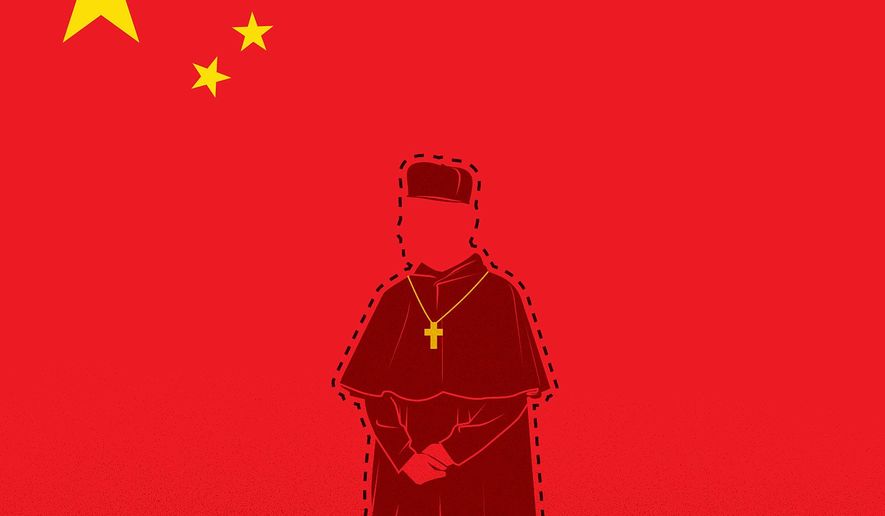OPINION:
Thirty-six years ago this Oct. 8, Bishop James Su Zhimin was arrested by the Chinese government.
He was never to be seen publicly again. It’s an appalling tactic and human rights violation the Chinese government inflicts on its citizens when it “disappears” a victim.
But Chinese Communist Party General-Secretary Xi Jinping, the dictator of China, knows where the bishop is and what happened to him.
Having met him in Beijing in 1994, I remain deeply concerned for the well being of Bishop Su, leader of Baoding diocese, whom the bipartisan congressional Tom Lantos Human Rights Commission has recognized as a prisoner of conscience.
For Bishop Su’s “crime” — merely expressing his universally-recognized human right of religious freedom — he has endured approximately four decades in prison.
A House hearing I chaired in July titled “Religious Freedom in China: The Case of Bishop James Su Zhimin,” featured witnesses from the U.S. Commission on International Religious Freedom, the Religious Freedom Institute and the Hudson Institute who testified about China’s war on freedom of religion. I asked what many, including the bishop’s relatives, want to know from Mr. Xi: Where is Bishop Su?
Bishop Su’s imprisonment is reflective of greater oppression of religious freedom in China — including how it pertains to the Catholic Church.
Many wonder if the 2018 temporary agreement between the Holy See and the Chinese government is in fact in the interest of religious believers in China and if the agreement ought to be renewed at all. In either case, it has broader implications with respect to the ability of faith communities to maintain relative autonomy from the state.
The bishop is either a living saint or felled martyr. If he is still alive, as I and his family greatly hope, then Mr. Xi must release him to his family and his faithful flock.
When I met Bishop Su in January 1994, he had already spent several years in prison unjustly for his faith, yet he had extraordinary gentleness, strength, courage and a peace that surpassed all understanding.
After celebrating Mass in a tiny apartment, Bishop Su told us he prayed for his persecutors and he especially prayed for the cruel and misguided CCP leaders.
His faith under the weight of beatings, starvation and torture amazes and inspires.
Sadly, Chinese authorities arrested Bishop SU before my delegation even left the country, holding him for nine days. In 1997, the government arrested him again, and the Bishop has not been seen since — except for a single time in 2003, when he was seen at a hospital in Baoding.
Despite his some 40 years in prison, the CCP refuses to say where they are keeping Bishop Su, and what they have done to him all these years.
There is new concern that this good and holy man may have died or been killed — as yet unconfirmed — because Chinese authorities have recently asked the Vatican to appoint a new China-approved bishop to the Baoding Diocese.
Before offering any replacement for Bishop Su, the Vatican and anyone who believes in religious freedom ought to insist on an answer to the question “Where is Bishop Su?”
It cannot be forgotten that, despite solemn promises and existing treaty obligations, Mr. Xi in recent months has relentlessly trampled upon the freedoms of the people of Hong Kong.
Nor can we forget Mr. Xi is today presiding over genocide against the Uyghur Muslims.
The CCP under Xi Jinping is continuing and expanding the most comprehensive attempt to manipulate and control — or destroy — religious communities since Chairman Mao Zedong made the eradication of religion a goal of his brutal and bloody Cultural Revolution in the 1960s.
Now Mr. Xi, apparently fearful of religious believers as a challenge to the Communist Party’s stranglehold on power, is trying to radically transform religion into the party’s servant, furthering Sinicization.
There have been reports of Mr. Xi’s government rewriting religious texts — including the Bible — that censor out passages not deemed acceptable by the atheist CCP, and in 2018 launching a five-year Sinicization plan for Chinese Protestant Christians.
In mid-September, European leaders in Brussels pressed Mr. Xi on his brutal crackdown on Hong Kong citizens and his human rights abuses of China’s minorities, as well as its blatantly unfair trade practices.
Of course, he once again brushed aside his government’s long and tragic record of abusing the rights of its own citizens.
Shortly thereafter, the U.S. State Department issued an official travelers’ warning that “The PRC government arbitrarily enforces local laws, including by carrying out arbitrary and wrongful detentions and through the use of exit bans on U.S. citizens and citizens of other countries without due process of law.”
Such flagrant abuse is not new for the Chinese government. There are many such instances, but the case of the long-missing Bishop Su is something which cannot be forgotten. His courage and faithfulness to God in the face of unspeakable abuse and inhuman cruelty inspires us to act with insight, decisiveness and prudence.
General-Secretary Xi Jinping, please answer the question: Where is Bishop Su and what have you done to him?
• Chris Smith is a Republican congressman from New Jersey, and the ranking House member and former chairman of the bipartisan Congressional-Executive Commission on China.




Please read our comment policy before commenting.